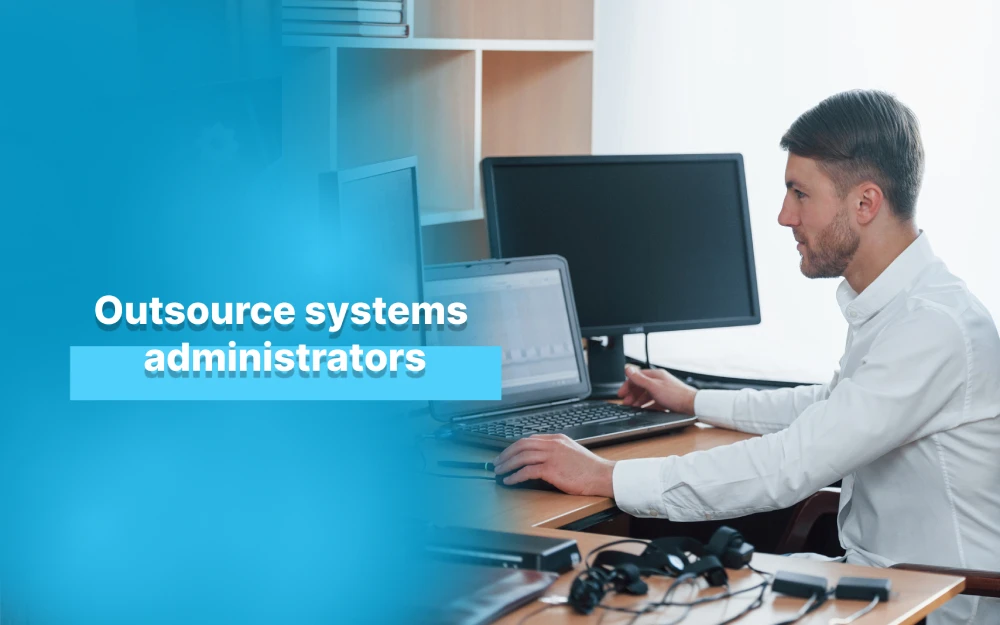CRM MS Dynamics Developer Customer Relationship Management (CRM) systems are essential tools for businesses to manage interactions with current and potential customers. Microsoft Dynamics 365, one of the leading CRM...
Outsource UX Design
outsource ux design In today’s fast-paced digital landscape, businesses are continually striving to create exceptional user experiences to stay ahead of the competition. User Experience (UX) design plays a crucial role...
What is outsourcing project management?
What is outsourcing project management? Project management is the application of knowledge, skills, tools, and techniques to project activities to meet project requirements. It involves planning, executing, and closing...
What is an Agile Coach?
What is an Agile Coach? An Agile Coach is a professional who helps organizations, teams, and individuals adopt and improve agile practices and principles. They play a pivotal role in facilitating agile transformations,...

Outsource systems administrators
What is a Systems administrators?
A systems administrator, often referred to as a sysadmin, is an IT professional responsible for the upkeep, configuration, and reliable operation of computer systems, especially multi-user computers such as servers. The primary role of a systems administrator is to ensure that the IT infrastructure of an organization runs smoothly and efficiently. This includes managing, troubleshooting, and maintaining servers, networks, and other computer systems, ensuring high availability and performance for users.
Key responsibilities of a systems administrators include:
Installation and Configuration: Setting up hardware and software systems, configuring servers, and installing necessary applications.
System Maintenance: Performing regular updates, patches, and upgrades to ensure systems are secure and up-to-date.
Monitoring and Performance Tuning: Continuously monitoring system performance and ensuring the efficient operation of the network and servers.
Security Management: Implementing and managing security measures to protect data and systems from breaches, viruses, and other cyber threats.
Backup and Recovery: Ensuring data is backed up regularly and can be restored quickly in the event of a system failure.
User Support and Training: Providing technical support to users, resolving issues, and training staff on new systems and software.
Key Skills and Qualifications of a Great Systems Administrator
Technical Skills:
Operating Systems: Proficiency in multiple operating systems, including Windows, Linux, and Unix.
Networking: Understanding of network protocols, configurations, and troubleshooting techniques.
Virtualization: Experience with virtualization technologies like VMware, Hyper-V, and others.
Scripting and Automation: Ability to write and use scripts (e.g., Bash, PowerShell, Python) to automate tasks and improve efficiency.
Security: Knowledge of cybersecurity principles, including firewalls, intrusion detection/prevention systems, and encryption.
Analytical and Problem-Solving Skills:
Troubleshooting: Ability to diagnose and resolve hardware, software, and network issues promptly.
Attention to Detail: Keen attention to detail to identify and fix system vulnerabilities and performance issues.
Communication Skills:
Clear Communication: Ability to explain technical concepts to non-technical staff and document system configurations and procedures.
Team Collaboration: Work effectively with other IT professionals and departments to support organizational goals.
Organizational Skills:
Time Management: Ability to prioritize tasks and manage time efficiently, especially during system outages or emergencies.
Documentation: Keeping detailed records of system configurations, changes, and procedures.
Educational Background and Certifications:
Education: A bachelor’s degree in computer science, information technology, or a related field is often preferred.
Certifications: Professional certifications can enhance credibility and expertise. Relevant certifications include:
Microsoft Certified: Azure Administrator Associate
CompTIA Network+
Red Hat Certified System Administrator (RHCSA)
Certified Information Systems Security Professional (CISSP)
Continuous Learning:
Staying Updated: Keeping up with the latest technology trends, software updates, and industry best practices through continuous learning and professional development.
A systems administrator plays a critical role in ensuring the smooth operation of an organization’s IT infrastructure. The combination of technical skills, problem-solving abilities, communication proficiency, and continuous learning makes for a successful systems administrator. As businesses increasingly rely on robust and secure IT systems, the demand for skilled systems administrators continues to grow.
What is Outsourcing in systems administrators?

Outsourcing system administration involves hiring external professionals or firms to manage and maintain a company’s IT infrastructure, including servers, networks, databases, and other critical systems. These outsourced administrators take on tasks such as system monitoring, security management, software updates, troubleshooting, and performance optimization.
The Advantages of Outsourcing System Administration
Cost Savings
One of the most compelling reasons companies choose to outsource system administration is cost reduction. Hiring and training in-house IT staff can be expensive, especially when you factor in salaries, benefits, and ongoing training. Outsourcing allows companies to convert fixed IT costs into variable costs, only paying for the services they need when they need them. This can lead to significant savings, particularly for small and medium-sized enterprises (SMEs).
Access to Expertise and Advanced Technologies
Outsourced system administrators are typically highly skilled professionals with extensive experience and up-to-date knowledge of the latest technologies and industry best practices. This expertise can be invaluable, ensuring that your systems are managed efficiently and effectively. Additionally, outsourcing firms often have access to advanced tools and technologies that may be too costly for individual companies to purchase.
Focus on Core Business Activities
Managing IT infrastructure can be time-consuming and distract from a company’s core business activities. By outsourcing system administration, businesses can free up internal resources to focus on strategic initiatives, product development, and customer service. This can lead to increased productivity and a stronger competitive position.
Scalability and Flexibility
Outsourcing provides businesses with the flexibility to scale their IT services up or down based on demand. Whether you are experiencing rapid growth or seasonal fluctuations, an outsourced system administration provider can adjust resources, accordingly, ensuring that your IT infrastructure supports your business needs without overcommitting resources.
Enhanced Security and Compliance
Security is a paramount concern for businesses of all sizes. Outsourced system administrators bring specialized knowledge in cybersecurity, helping to protect your systems from threats and ensuring compliance with industry regulations. They can implement robust security measures, conduct regular audits, and stay abreast of evolving security threats.
24/7 Monitoring and Support
Many outsourcing providers offer round-the-clock monitoring and support services. This ensures that any issues are promptly identified and addressed, minimizing downtime and ensuring continuous system availability. For businesses that operate globally or outside of traditional business hours, this level of support can be crucial.
At Talents, we provide technical outsourcing services that connect you with top System Administration, ensuring your projects are handled by experts. Whether you’re an employer looking to hire skilled developers or a developer seeking new opportunities, Talents is your trusted partner in the world of System Administration.




